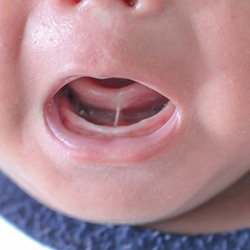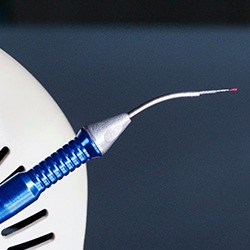Lip & Tongue Tie Treatment – Casper, WY
Gentle Laser Frenectomies for Lip & Tongue Ties

Lip and tongue tie diagnoses are on the rise and more parents are learning the signs to keep an eye out for. If your child is having trouble nursing, has digestive issues and excessive fussiness, or food sensitivities, our wonderful pediatric dentist in Casper, Dr. Paulson, offers precise and fast soft tissue laser frenectomies. Call our office today to schedule an evaluation for your baby and get more information on lip and tongue ties from our knowledgeable team.
Why Choose Casper Children’s Dental Clinic for Lip & Tongue Tie Treatment?
- Soft Tissue Laser Frenectomies for Improved Comfort
- Fun & Gentle Pediatric Dentist with Years of Experience
- In-Network with Most Major PPO Dental Insurances
How Do Lip & Tongue Ties Develop?

Lip and tongue ties develop during gestation, while your baby is still growing. Thick pieces of tissue, known as frenulum, begin to form that connect their lips to their gums and their tongue to the floor of their mouth. When these become overgrown, like too thick or too long, they can result in a variety of symptoms as well as decreased oral mobility, impacting your baby’s development. Some of the signs to look out for include:
- Difficulty latching while nursing
- Sore nipples
- Little weight gain
- Fussiness due to colic
- Aversion to certain solid foods
- Difficulty pronouncing certain sounds
The Importance of Treating Lip & Tongue Ties

Lip and tongue ties may not seem like a major issue, but they can have more of an impact on your child’s ability to eat, speak, and develop than you would think. When left untreated, these complications can result in speech delays, chronic digestive issues, teeth grinding, sleep-breathing disorders, and even impact posture. Not only will treating lip and tongue ties help with oral mobility, but your little one will also be able to enjoy much more comfortable and effective eating and speaking habits in the long run. Don’t hesitate to reach out to our team if you have any questions or concerns, as we’ll be more than happy to walk you through your child’s treatment options to improve their smiles.
What is a Frenectomy?

Lip and tongue tie treatment is referred to as a frenectomy. This process is relatively quick and simple, and completely safe for infants and young children alike. Dr. Paulson uses a soft tissue laser to conduct frenectomies in Casper. This device emits a small beam of light that can easily remove overgrown oral tissue in addition to cauterizing it. As a result, babies experience significantly less post-operative discomfort compared to traditional frenectomy techniques. Its precision also makes treatment less invasive.
After the frenectomy, you may notice your child being more open to eating certain foods, getting better rest, and even pronouncing new words that they may not have been able to before!
Lip & Tongue Tie FAQs
Is My Child Old Enough to Get a Lip or Tongue Tie Treatment?
The good news is that there is no age limit or minimum when it comes to providing a lip or tongue tie for a child. Of course, we understand that it isn’t easy to imagine your little one undergoing a procedure such as a laser frenectomy. However, the reality is that this process is extremely safe, swift, and effective, and it can even be performed mere days after birth. A lip or tongue tie will not vanish on its own, so it’s generally best to have your child treated sooner rather than later if they have this issue. The quicker we’re able to resolve the problem, the better the chance that they’ll get to enjoy a life with incredible oral function.
Are There Diet Restrictions After a Frenectomy?
Fortunately, you should not expect there to be any changes in your infant’s diet even after they’ve undergone a frenectomy. Breast milk or formula should still be okay for them. That said, if the treatment is required for patients who are toddlers, children, or adults, then our team will likely recommend that they don’t eat anything until the anesthesia wears off (if they require it). This is to prevent them from accidentally biting or hurting themselves since they’ll be pain-free for a while. For the first couple of days following a frenectomy, it’s best to avoid cold, hot, spicy, salty, or acidic foods, which can irritate the soft oral tissue and hinder its recovery.
Can I Be in the Room During My Child’s Frenectomy?
This might depend on the specific specialist, but in most cases, it’s highly recommended that parents are not in the room while their child is undergoing the procedure. We understand that this can be difficult, but we want to ensure that we prioritize the patient’s needs first and foremost. By waiting outside, the parent can avoid feeling more uneasy and our team can focus on the process without any hiccups. Having a parent in the room can potentially make a quick procedure take a little longer. Once we’ve completed the treatment, parents will be more than welcome to return to the room to be with their little ones.
